
By Corey Lynn
The “whole child,” “whole family” psychological approach through the social emotional learning (SEL) agenda wouldn’t be as far along as it is without the help of the U.S. Department of Education and multiple other agencies involved to bring it into a full technological infiltration of every human, and every mind on this planet. The level of coordination, funding, and rollout of these mind control programs is astonishing.
This is a 9-part series on the psychological agenda of obedience training being systematically unleashed on the entire population PreK-Adult in a lifelong learning journey, to move everyone into a one-mind, one-belief system, and develop a global citizenship with a digital citizen workforce operating under tyranny for their fourth industrial revolution—and billions are pouring into it, with advancements already in 110 countries.
READ:
Part 1: Introduction
Part 2: The Programming
Part 3: Spirituality in Education Programming
Part 4: WEF Vision for Global Education System
From Academics to Brainwashing
“The U.S. Department of Education takes their orders from the UN because this is an international plan.” – Charlotte Thomson Iserbyt, former Senior Policy Advisor to the U.S. Department of Education and author of the ‘Deliberate Dumbing Down of America’
In a 2000 interview, Iserbyt explained how in 1965 they had begun to change the education system from academics to behavioral modification, and brought in “Pacesetters in Innovation” in 1968, which were programs to brainwash children. By 1973, a “Change Agents Guide to Innovation in Education” was published to carry out these same agendas in a constant social engineering spiral to alter attitudes and values, and move from a free to a socialist planned economy through the new world order, that was all about building a workforce, and lifelong learning from kindergarten to 80-years-old. In 1979, the U.S. Department of Education was created under President Carter.
“There is nowhere in the constitution that calls for a Department of Education. Anything not listed in the constitution as a role of the federal government, is left to the states,” said Iserbyt.
Federal funding is a disaster for the education system because it allows them to have too much control. This means that any private or charter schools taking funding from the federal government are putting themselves in jeopardy.
According to the beliefs of those who’ve launched the PreK-Adult psychological agenda long ago, there is no “right or wrong,” because they always leave room to assert that “sometimes it’s ok,” blurring any moral line innate in humans, while making minds more malleable.
Iserbyt pointed out a key manipulation tactic that has reared its ugly head numerous times over the past two years, with the burning of significant buildings and churches, removal of historical statues, and the attempts to change history before our very eyes. “If you want to put the Americans under a global management system be very careful you don’t teach them the constitution, the bill of rights, don’t let them have any history because they are going to object when this system is taken away from them,” said Iserbyt.
By 2010, the creation of Common Core, or what Iserbyt likes to refer to as “Communist Core,” was instituted, which Bill Gates almost single-handedly funded through his revolving slush fund accounts.
The social emotional learning strategy has long been in placed, was brought to the public eye in 1994 by the creation of CASEL, and as of 2016, has moved into full force across the globe, as documented in parts 2, 3 and 4 of this report. When they continue to change the language and terminology throughout the years, their hope is that parents and teachers won’t catch on to this mind control obedience program taking over their lives in the most subtlest of ways.
Isberbyt breaks it down as a 3-prong approach:
1) Gradualism – The frog in cold water metaphor: they slowly turn up the heat so the frog doesn’t know it’s being cooked.
2) Dialectic – The globalists create a crisis, then save the day.
3) Semantic Deception – They have different definitions for words.
She couldn’t be more spot on with this assessment. For example, when they talk about “values,” that represents ONLY their values they want to instill in your child and in you. When they say “equity,” they mean what is “fair” for them because everyone and everything is to serve them (the globalists funding these agendas, which is covered in parts 6 & 7, and throughout this report.) When they talk about “behavior” and “character traits” this is all about the behavior they expect, through obedience to them. Once you understand the agenda, it becomes second nature with a built-in automatic translation as you are reading their words.
According to Iserbyt, the Carnegie Foundation played an influential role in establishing the education system on an international level, including coordination with the Soviet Union during the Gorbachev years. She notes that the Rockefellers were more interested in the education system on the domestic front. As covered in part 2 of this series, it’s no secret that Andrew Carnegie and John D. Rockefeller played a significant role in the U.S. education system with their enormous endowments, giving them a lot of influence.
In Socialist Bertrand Russell’s ’The Impact of Science on Society’ (1953), he wrote:
It is to be expected that advances in physiology and psychology will give governments much more control over individual mentality than they now have even in totalitarian countries. Fichte laid it down that education should aim at destroying free will, so that, after pupils have left school, they shall be incapable, throughout the rest of the their lives, of thinking or acting otherwise than as their schoolmasters would have wished…Diet, injections, and injunctions will combine, from a very early age, to produce the sort of character and the sort of beliefs that the authorities consider desirable, and any serious criticism of the powers that be will become psychologically impossible.
Removing School Boards to Remove Your Rights
In the thick of the indoctrination and “mental health” programs rolling out, there is something else happening – by design. A new law recently passed in South Carolina that allows the state education superintendent to declare a “state-of-education” emergency and fire the entire school board in districts that have “underperformed” for three consecutive years. This goes into effect in July 2022. Once the State Board of Education agrees with the superintendent, the firing begins and the state gets a minimum of six years to take over the district to “improve it.”
At first glance, this may not seem like such a bad idea if schools are “underperforming,” but considering what is taking place throughout the education system across the country, it sets up the perfect strategy, while leaving parents with little say or rights when it comes to their children’s education.
This may be new in South Carolina, but this has been happening in at least 20 states for awhile now. According to a 2016 report by News21, “lawmakers have stripped locally elected school board members of their power in impoverished, mostly minority communities, leaving parents without a voice or a vote in their children’s education.” Between 2010-2016, the states took over schools and school districts in locations that consist of 5.6 million people. Without having tracked beyond 2016, it’s difficult to say what that number is up to now.
This is a time where many people are choosing to homeschool and get involved with homeschool groups, which is a great thing so long as you stay away from vouchers and any federal funding. But for those who still have children in the public school system, be sure to pay attention to this strategy being rolled out.
U.S. Department of Education
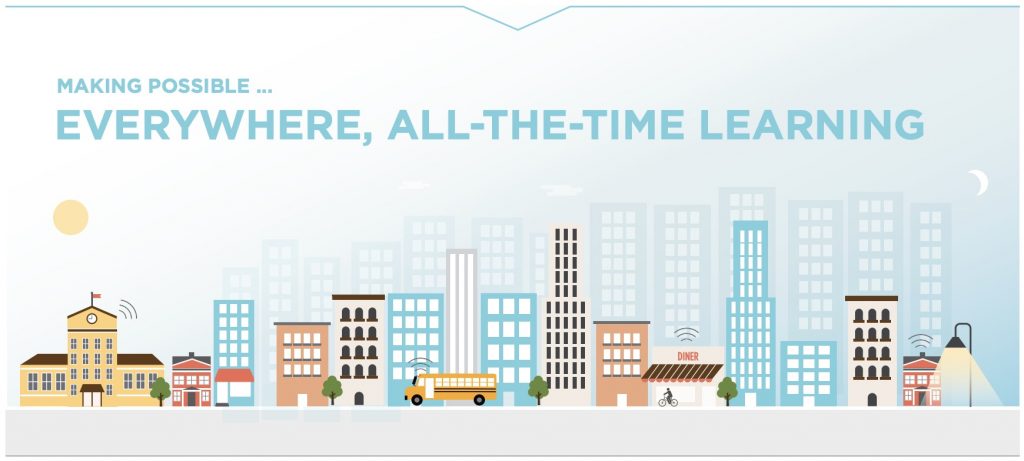
As far back as 2011, the Institute of Education Sciences, an independent evaluation arm of the U.S. Department of Education, granted the University of Virginia $2,774,333 to evaluate the efficacy of the WINGS for Kids after-school social and emotional learning (SEL) program. But, it’s quite clear this “mental health,” “workforce” agenda began decades ago.
In January 2017, the U.S. Dept. of Education’s Office of Educational Technology rolled out the plan for “Reimagining the Role of Technology in Education,” an 111-page document with an “everywhere, all-the-time learning” approach which of course includes embedding SEL into the tech, and a virtual reality future.
In October 2018, The Center to Improve Social and Emotional Learning and School Safety (CISELSS) was launched by WestEd in partnership with Transforming Education, CCSSO, and the RAND Corporation, and is funded by the U.S. Department of Education to provide support to states and districts in the implementation of SEL programs and practices.
Biden’s new Secretary of Education, Dr. Miguel Cardona, was sworn in on March 2, 2021. Prior to this, Cardona was the Commissioner of Education in Connecticut with a focus on “equity” and recognized “the increased importance of providing resources for the social-emotional health of students and staff. He collaborated with the Yale Center for Emotional Intelligence and other stakeholders to provide free social and emotional learning courses.
On June 24, 2021, Cardona published a statement regarding policies and priorities of the U.S. Department of Education. Under the American Rescue Plan Act he stated, “ARP funds will enable schools to address the mental health, social, and emotional needs of students that the pandemic has laid bare, and to fully recover from the massive impact of lost instructional time on student achievement during the pandemic.” Just three weeks later, in an interview with EdSource, Cardona encouraged schools to spend the federal stimulus money from the American Rescue Plan Act in ways that will support students’ “emotional needs.”
Cardona pushes for full family vaccination against Covid-19, masks in schools, social and emotional learning (SEL programs), climate change agendas, diversity, equity, inclusion, reimagining, and all of the other buzzwords that the globalist agenda builders adhere to. He wants “free preschool for all” because as the WEF white papers and other documents have pointed out – starting children on SEL while they are young and in preschool will accelerate their agenda, as they mold a child’s mind to conform to the one mind, one belief system.
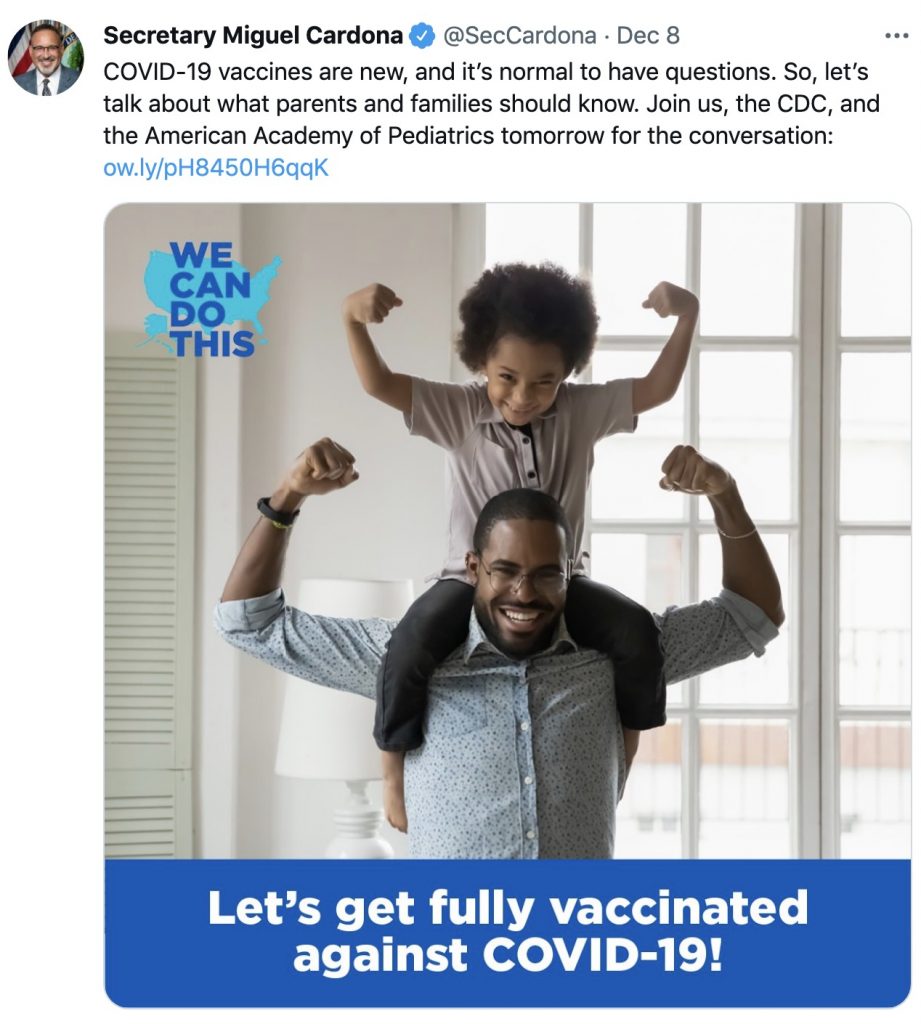

On May 11, 2021 Cindy Marten was confirmed as the new Deputy Secretary of the U.S. Department of Education. In a statement by Secretary Miguel Cardona, he reiterated that their “top priority at the Dept. of Education is to reopen America’s schools for in-person learning, support students’ social, emotional, and academic needs, and address inequities that have been exacerbated by the pandemic.” It also mentions the fact that Marten, as a teacher and principal, “established a commitment to educating the “whole child” through an emphasis on social and emotional learning and the arts, combined with academic rigor.”
On October 19, 2021 – The U.S. Department of Education released “New Resources on Supporting Child and Student Social, Emotional, Behavioral and Mental Health during Covid-19 Era.” In the statement by Secretary Cardona, he stated “Our efforts as educators must go beyond literacy, math, history, science, and other core subjects to include helping students to build the social, emotional, and behavioral skills they will need to fully access and participate in learning and make the most of their potential and future opportunities,” and stressed that ARP ESSER alone has $122 billion available for these needs. Linked, is the Ed Covid-19 Handbook – ‘Roadmap to Reopening Safely and Meeting All Student’s Needs,’ which has an entire chapter on meeting the social, emotional, and mental health needs of students, using SEL as the platform, with a direct link to CASEL’s website. Also linked is the manual on “Supporting Child and Student Social, Emotional, Behavioral, and Mental health Needs” which is primarily about SEL programs. They also plan to double the number of school psychologists, counselors, and physicians.
In the executive summary, they break down seven recommendations, including establishing an integrated framework of educational, social, emotional, and behavioral-health support for all, leveraging policy and funding, enhancing workforce capacity, and most importantly – using data for decision making to promote equitable implementation and outcomes.

Following the executive summary, they show examples of select implementation strategies carried out at various schools. In one example, an elementary school in Michigan embedded coping skills into their “school-wide behavior matrix” as part of the SEL-embedded framework. They state that they continue to “alter their action plan based on their data and the changing needs of the students and school, such as including more coping skills that students can engage in right at their seats given the pandemic.” Data mining is the key element to this entire agenda, and is covered more in depth in part 8.
U.S. Department of Health and Human Services (HHS)
The Department of Health and Human Services has an ongoing podcast rolling out for “Enhancing Mental Health & Social-Emotional Learning (SEL)“, which include informational videos for parents to provide them with “insights on SEL in their own parenting practices,” as well as resources from CASEL.
Via Executive Order #14000, the U.S. Department of Health and Human Services (HHS) and the U.S. Department of Education have established an Interagency Workgroup for ‘Supporting the Reopening and Continued Operation of Schools and Early Childhood Education.’ In doing so, they have launched several initiatives with millions of dollars in funding. One initiative is Project Launch, which is a grant program that focusses on promoting wellness in children from birth to age 8 and includes addressing social, emotional, cognitive, and behavioral aspects of their development so they can enter school ready to learn. They cover the fact that the CDC is focussed on building school district infrastructure to help students recover from the adverse impacts of the “Covid-19 pandemic,” including incorporating social emotional learning (SEL) into their strategy.
Center for Disease Control and Prevention (CDC)
The CDC is promoting SEL with information for parents on how to support SEL, and an abundance of resources that link to CASEL, George Lucas Educational Foundation’s Edutopia, and other CDC pages. They’ve even developed their own little framework from WEF’s white papers and the CASEL frameworks, called “Whole School, Whole Community, Whole Child (WSCC).” Based on the earliest archives, this CDC page seems to have first appeared on their site in April 2020.
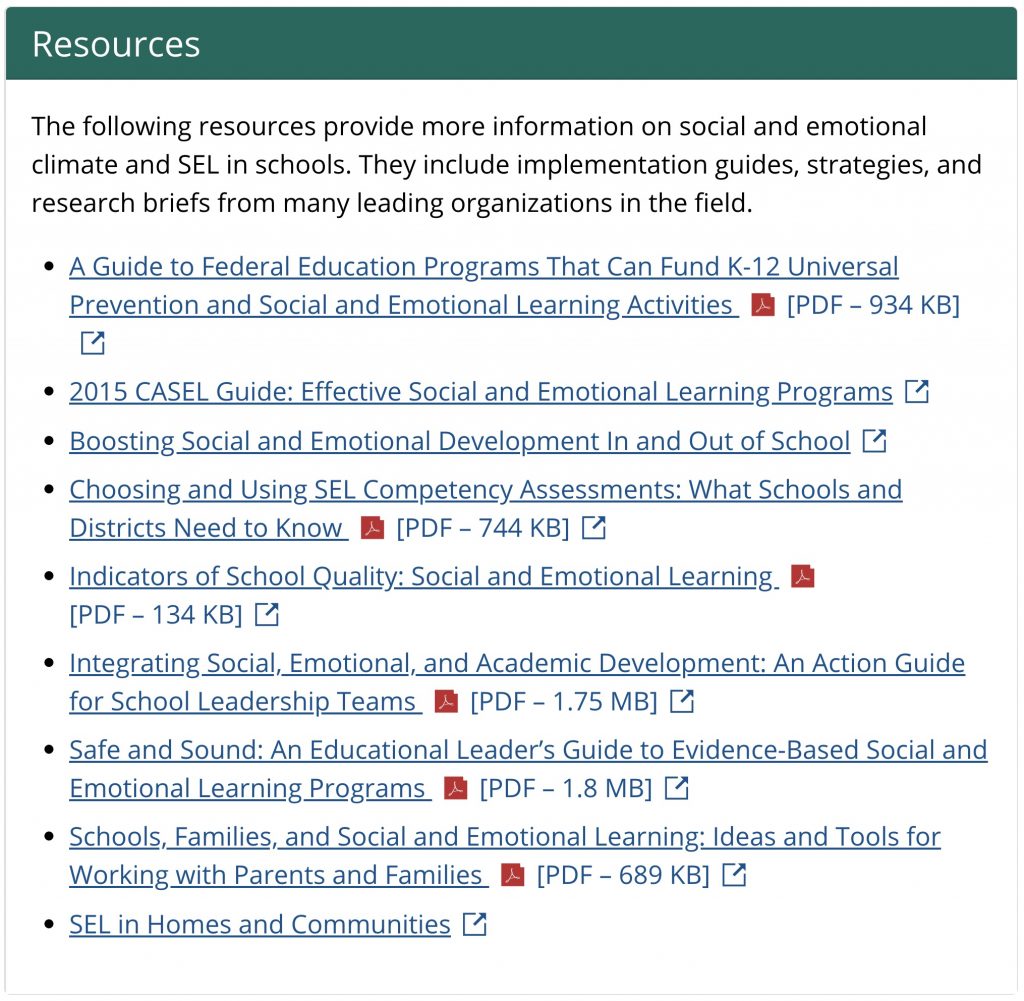
National Science Foundation
The National AI Initiative Act of 2020, which was implemented January 1, 2021, budget authorizes nearly $4.79 billion in funding for AI research at the National Science Foundation over the next five years, $1.15 billion at the DoE, and $390 million at NIST. The US National Security Commission on Artificial Intelligence (NSCAI), launched in March 2021, called for at least $8 billion towards AIR&D annually.
The National Science Foundation (NSF) has an annual budget of $8.5 billion and funds 27% of the total federal budget for basic research conducted at U.S. universities and colleges. NSF isn an independent agency of the U.S. government that supports research and education in non-medical fields of science and engineering. They have created numerous AI Research Institutes across the U.S.
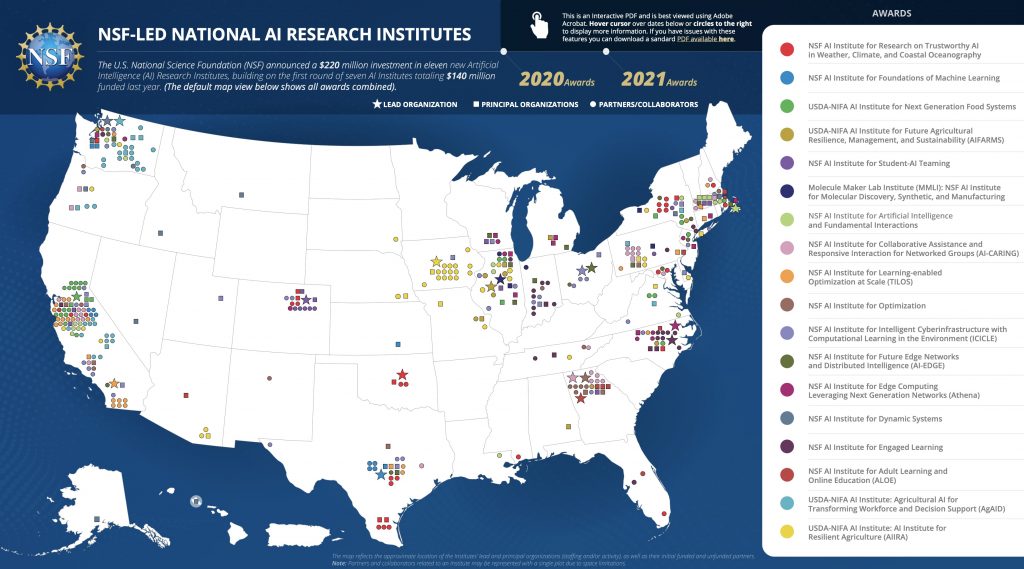
One of the big factors of embedding SEL into education and beyond is for purposes of data mining through a diverse range of smart devices and technology. This is important to their future global vision of virtual reality, robotics, and blockchain.
Here are just a handful of examples of how involved the NSF is in merging technology with SEL programs from birth to adults, to create multi-pronged obedience training:
In 1996, they studied the difference in infants’ social emotional behavior during mother-infant and father-infant interactions, and who and how it developed their personality and ability to control impulses, anger, aggression, and psychological functioning, among other things. One can see the significant role this data would play in carrying out specific agendas.
In 2005, they funded MIT nearly $200K to develop the first known wearable device capable of perceiving and reporting on social emotional information in real-time human interaction. They state that this research will help individuals with Autism, and the results can be leveraged for human-computer interaction, wearable computing, robotics, and future technologies with social-emotional intelligence.
In 2006, a grant of $500K was awarded to Northeastern University MA to build a virtual laboratory and study social-emotional human to robot engagement over the course of four years. Their goal is to determine how people and computer agents can optimally live and work together over extended periods of time, and provide new vocabulary, models and paradigms for thinking about relationships.
In 2015, NSF awarded $750K to Giant Otter Technologies, Inc. for a virtual role-playing simulation for social emotional learning using artificial intelligent characters.
In December 2017, NSF awarded $225K to Personalized Learning Games Inc. to assess and improve behavioral readiness and social emotional skills for students in kindergarten and first grades.
In June 2018, NSF awarded a $50K grant to Vanderbilt University to develop a digital platform for social-emotional learning that consists of a software framework that collects data from user engagement to highlight risk factors affecting children’s performance in social and educational settings. This data supplements the P-20 state-level system that is covered in part 8 of this report. This newly integrated platform will allegedly provide a “cohesive message for transformation, moving children and communities from risk to resiliency, positive character development, and overall wellness.
In January 2019, NSF awarded a $225K grant to Deep Designs LLC for developing a multiplayer augmented reality-based gaming app that “immerses fourth and fifth-grade students in activities designed to build their skills of emotional intelligence; namely, emotional self-awareness and empathy.” Their intention is to integrate social and emotional learning into regular classroom activities, aligning with NSF’s mission to develop innovative education programs for emotional intelligence.
In June 2019, NSF awarded Affectifi Inc. $225K to develop an educational technology application to build emotional literacy in adolescents and adult learners, with a plan to create a mobile solution for the general population to build a more aware, tolerant, just, and peaceful society.
In February 2020, NSF awarded the McLean Hospital Corporation a $75K grant to integrate STEM and Social-Emotional Development (SED) into out-of-school time programs.
Organization for Economic Co-operation and Development (OECD)
In June 2021, the OECD released their 93-pg report on the “State of Implementation of The OECD AI Principles” which has been adopted by over 46 countries and the G20 AI Principles as well. Part of their strategy involves countries developing centralized, accessible repositories of open public datasets including government health records and satellite data. They promote initiatives that enable private sector data sharing.
This entire report breaks down what is happening with AI, robotics, labor force, data collection, biometrics and digital control mechanisms across the world, going into detail in specific countries. The future is all-encompassing of AI and they want all children plugged in, monitored, and manipulated for the future workforce.
The OECD created the international “Survey on Social and Emotional Skills” to identify and assess practices that foster or hinder the obedience training of social and emotional skills for 10 and 15-year-old students, by collecting data from parents, students, teachers, and school principals, which they then use to assess typical behaviors, thoughts, and feelings.

The survey itself asks questions pertaining to the student, parent’s background characteristics, family, school, and community. It’s a wealth of data for the manipulation giants, and parents have been willingly filling these surveys out across the globe.
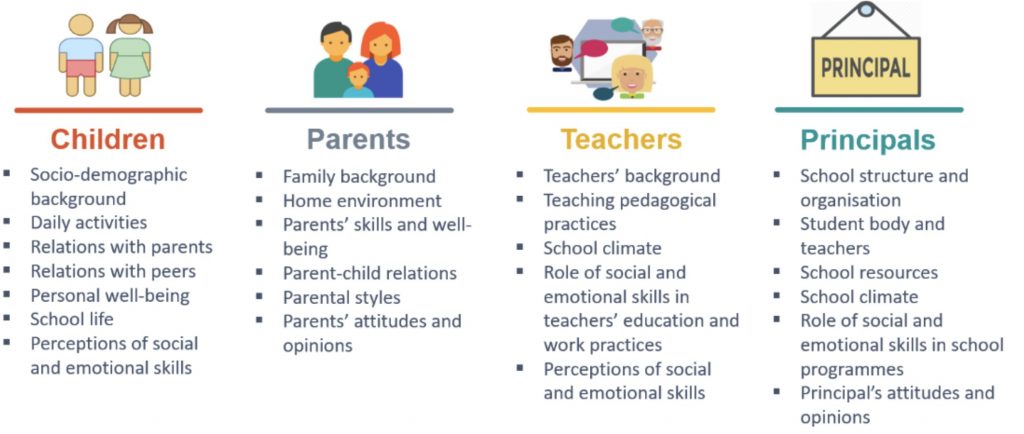
This is by no means a comprehensive view of the full extent of the involvement these agencies all have in this agenda, nor does it include all those involved, but it shows a clear path they are taking toward making this a global reality. Everyone from DARPA, to UNESCO, UN, WHO, IBM, and other big tech firms, are all aboard the AI train to rule the human brain PreK-Adult.
“I mean, pretty much we’re starting to think that machines can think like us. We’ve got unbelievable achievements in biotech, in robotics, of course, 5G as a platform to make it all happen.”– CEO Safra Catz, Oracle.
This report is sponsored by The Solari Report.
Previous Chapters:
Part 1: Introduction
Part 2: The Programming
Part 3: Spirituality in Education Programming
Part 4: WEF Vision for Global Education System
Subsequent Chapters:
Part 6: Huge Private Sector Funding Toward Obedience Training and SEL Agenda
Part 7: Billions in State & Federal Funding, and Legislation
Part 8: Surveillance, Data Mining, and Social Score for All
Part 9: Timeline, Recap List of Over 300 Organizations Involved, and Conclusion
This full 9-part report will be available in a single PDF for download in The Bookshop once it’s published in its entirety.
